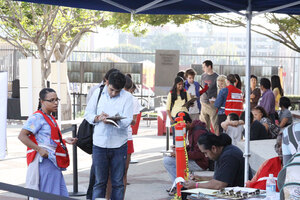Swine flu rates down, officials still wary
With National Influenza Vaccination Week drawing to a close today, officials continue to warn college-aged students to get vaccinated, despite a national drop in H1N1 cases in December.
Although the number of states reporting widespread flu activity dropped from seven to four during the last week of December, students who are not vaccinated against the H1N1 virus — commonly known as swine flu — are still at risk to contract the virus, according to the Los Angeles County Department of Public Health.
“People have the perception that we’ve kind of gone through this, but what we do know is that this virus will stay around in some form for multiple years,” said Jeffrey Gunzenhauser, medical director for the LACDPH.
A drop in flu activity is most likely because of the population’s increasing immunity. This immunity can come from a vaccine or from previously contracting the virus.
Dr. Lawrence Neinstein, executive director of the University Park Health Center, said the health center has also noticed a decline in H1N1 cases, reflecting the national trend.
“We have seen very little H1N1 or presumed H1N1 in the past month,” Neinstein wrote in an e-mail.
The number of H1N1 cases reported to the California Department of Public Health was 72 cases between Dec. 20 and Dec. 26, a drop from the 209 cases reported the previous week. This decrease marks the passing of the “second wave” of the H1N1 influenza, officials say.
Though the second wave seems to be a thing of the past, health officials still warn about the possibility of another wave in the future.
“Past pandemics have had multiple waves, including a third wave,” said Matthew Reynolds, spokesperson for the Centers for Disease Control. “But there’s no way to know if we’re going to have one now.”
Neinstein said the health center still recommends that students even though the virus seems to have dropped off for now.
“It is very possible, per health department and CDC, that there will be a third peak that occurs somewhere between January and March,” Neinstein said.
Lizz Clark, a sophomore majoring in industrial and systems engineering who contracted the H1N1 virus last fall, said she believes students should still be concerned about another outbreak.
“College students should definitely be more aware of the flu than non-college students … [It] can affect so many more people in such a short amount of time,” Clark said.

